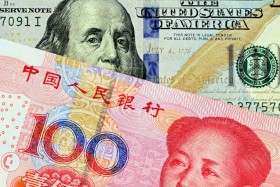
The Chinese yuan is strengthening to kick off the trading week as the central bank vowed to adopt a more targeted and appropriate monetary policy in the post-coronavirus economy. With Beijing ostensibly winding down its ultra-aggressive stimulus and relief efforts on the monetary side, investors will be watching to see if Chinese investments will remain on an upward trajectory. The yuan is also testing 6.9 against the US dollar on the latest inflation data.
Speaking in an interview with Xinhua News Agency, Peopleâs Bank of China (PBoC) Governor Yi Gang stated that the institution would transition into a more flexible, appropriate, and targeted form of monetary policy. Yiâs comments come after weeks of reports that the PBoC would begin to be less aggressive in the second half of 2020 and only stimulus sectors that needed assistance.
He did note, however, that credit would continue to be higher for the rest of 2020 than in other years. This is supported by recent data that showed credit growth surged by double digits in July.
Yi also confirmed that Beijing would meet the provisions of the phase one trade agreement with Washington, despite trying to recover from the COVID-19 public health crisis.
No matter how international situation changes, the most important thing is that we take care of our own affairs and firmly deepen financial reforms and opening up. Firstly, weâll continue to implement the phase-one trade deal with the US
Later this week, Chinese Vice Premier Liu He is scheduled to hold a video conference with Treasury Secretary Steven Mnuchin and Trade Representative Robert Lighthizer. The purpose of the meeting is to reportedly review the implementation of phase one and reassure that both sides remain committed to honoring the deal.
Meanwhile, the PBoC pumped more liquidity into the financial system on Monday through reverse repurchasing agreements. The central bank injected approximately $1.44 billion into the market via seven-day reverse repos at an interest rate of 2.2% to ensure ample liquidity in the banking system.
In a surprise move, the PBoC allowed the first commercial bank to go bankrupt in two decades. The central bank authorized liquidation of regional lender Baoshang Bank, which comes one year after it was taken over by the PBoC. The decision was made after authorities discovered âsevere insolvencyâ during a review of its books. It was an unconventional move for a country that had been hesitant to allow any high-profile bank to go bust.
On the data front, the inflation rate rose 0.6% in July, up from a 0.1% dip in June. The producer price index (PPI) tumbled at an annualized rate of 2.4% last month, up from the 3% decline in the previous month. Foreign exchange reserves advanced from $3.112 trillion in June to $3.154 trillion in July.
The USD/CNY currency pair fell 0.13% to 6.9589, from an opening of 6.9678, at 14:28 GMT on Monday. The EUR/CNY dropped 0.25% to 8.1924, from an opening of 8.2133.
If you have any questions, comments, or opinions regarding the Chinese Yuan, feel free to post them using the commentary form below.